- Home
- Michael McDowell
Gilded Needles Page 3
Gilded Needles Read online
Page 3
Daisy Shanks pulled her chair closer to the fire and began to detach the silk fringe from a shawl that had been taken from a house on West Nineteenth Street that morning. The gold clock on the mantel ticked loudly and the coals shifted themselves in the gilded grate. From outside came the occasional shouts and drunken songs of those passing along West Houston Street.
At a quarter past one, Rob and Ella suddenly appeared in the doorway, quite clean and neatly dressed again.
“Come here,” said their mother, smiling. The twins stepped forward and Rob handed his mother seven dollars in gold and silver.
“Were you stopped?” asked Lena.
“No,” replied Rob, “no one even looked at us, except to tell us to move to the side of the street, and a man in a black coat asked if my soul was saved.”
“Did the man on Bleecker Street quarrel over the price?” asked their mother.
Rob shook his head. “I told him seven dollars and he said was it a man or a woman, and I said a woman and he gave me seven dollars.”
“Hold out your hand,” said Daisy. The children thrust out their palms, and their mother dropped a silver dollar into each. “Tomorrow we go out. Spend it how you like. To bed now,” she said, leaning forward to kiss each.
Ella then turned to go, but Rob lingered a moment, glancing at his mother. “The lady upstairs, could I see her? Very beautiful, ain’t she?”
“Lovelier than wax,” said Daisy. “Creep up. Creep up and see her, then come down here again, tell me how she sleeps. Ella, go ’long too.”
The two children hurried up the stairs of the darkened room next to that in which the actress turned feverishly upon the bed. This was a small chamber, fiercely cold, directly beneath the roof, with one window that looked out over the houses in back. Ella stooped down near the baseboard and pushed aside a panel in the connecting wall. The twins crawled through, Ella first, and crouched behind a screen, listening to the drugged woman’s breathing.
Rob peered around the edge of the screen and then stepped from behind, motioning his sister forward. They crept to the edge of the little iron bed and stood with their hands clasped, looking down at the actress. Her fine black hair was disheveled and her complexion of chalk and rouge had been ruined by hot tears and the coarse pillow beneath her head. The rubies in her ears were like spots of thick blood. The small watch on her breast ticked more loudly than her uneven breath came. Her features had become drawn and sharp under the influence of the drugs she had been given and the flickering failing light of the fire in the grate made them even more grotesque.
So lightly that she did not stir, Rob touched two fingers to the sleeping woman’s braceleted wrist and felt her pulse. He nodded to his sister and they retreated behind the screen, slipped through the wall, replaced the panel, and stood erect in the dark frigid room behind.
They smiled at one another, and whispered liltingly: “ ’Rings and watch and jew-la-ry . . .”
Chapter 3
For several weeks before New Year’s, every house in New York with any pretension to fashion is in an uproar of cleaning and cosmetic improvement. It is at this time that new furniture is purchased, new draperies sewn, new paper put up, and new carpets laid down. The families of immigrant Italian artisans have happy Christmases because of the trade in painting and gilding. The only new ornament that will not appear in this season is a portrait, for no one will sit still long enough for the likeness to be taken.
In these weeks, men sit quietly out of the way, behind the locked doors of their studies. Servants are overworked and mistresses are exhausted and short-tempered. Cellars and larders are restocked to make one think the island will be shortly under siege. The farmyard population of New Jersey is decimated, and the ferries across the Hudson River are laden with the carcasses of slaughtered cattle, swine, and fowl. The bakeries and breweries hire on extra help, and the younger sisters of maids and cooks obtain their first experience in service at this time. The stoves never cool down and dressmakers give over sleep as an impossible luxury.
The custom of paying calls on New Year’s Day was instituted among the Dutch in the seventeenth century, and though two hundred years have passed, the city increased in size many hundredfold, and Dutch manners, dress, and accents are now contemptuously parodied on the variety stage, New Year remains the unavoidable, frenzied, garrulous, overwhelming crux of the social season.
New Year always dawns bright—no matter what the weather. Calls begin at ten o’clock, or a few hours later when the holiday falls upon a Sunday. The social work of the day is evenly divided: it is the men who pay calls and the women who receive them. The city from morning till sometime after dark is a monstrous winter beehive of increasingly drunken drones paying their respects to increasingly weary queens.
Gentlemen boast of having swallowed a glass of champagne or punch in more than sixty houses. Women more discreetly display the large basket of visiting cards that have been collected in the course of the day. The hallways are filled with cold air, because the outside door is never closed for long, and hostesses pray for dry weather so that their new carpets will not be completely spoilt with mud. Platters of food are constantly brought up from the kitchen by harried servants, who themselves become ever more sodden with expropriated wines and delicacies—perks of the day.
When the food gives out, or the sun goes down, or the callers become obstreperous and unintelligible, the draperies are drawn and a basket is hung upon the closed street door. The ladies of the house are no longer receiving.
They stand about, bemoan the wreckage, wonder briefly if their husbands and sons have met with the accidents that are so common on this day, direct the servants to begin cleaning up, and retire to quiet darkened rooms on the upper floors.
On the next morning, fortunate men lie abed and wonder if they will die. The unfortunate find themselves in jail for some act they cannot remember committing. No one wants to think how many ladies he may have offended in the course of the day.
The ladies put on their heaviest veils to hide their red eyes and go out on quiet calls to their friends, trading stories of excesses committed by gentlemen and giving careful inventories of how much was eaten and drunk.
For servants, New Year of 1882 was to be a doubly wearying day, for it fell upon Sunday. Their Sabbath holiday must be forgone, and they worked all the harder for the deprivation. Days on either side of New Year’s would be hardly less busy than the holiday itself, what with Saturday taken up with preparations and Monday consumed clearing the debris. In a spirit of retaliation, servants the entire city over determined to eat and drink until they were sickened or rendered insensible.
Late on New Year’s afternoon, when the sun had just sunk behind the Gramercy Park Hotel, leaving a vivid pink haze over the city, a well-dressed young matron could be seen standing in the long window of her parlor, looking out over desolate Gramercy Park and watching as her last two guests descended the steps of her home. She smiled, raised her hand, and waved prettily to the stumbling gentlemen as they passed on the walk.
As soon as they were out of sight Marian Phair stepped back, slammed the louvered shutters shut, and cried, “Thank Heaven! It’s done with!”
She whirled about and strode into the dining room, where the servants had already begun to clear the tables. “Amy,” she demanded of a pretty Irish housemaid, “where’s my niece?”
“With the children, I think, ma’am.”
“Go and get her then!”
Though Amy carried two large trays and with one foot was pushing open the door that led to the kitchen stairs, she came back without protest, knowing the danger of crossing her mistress. Handing the trays to Peter Wish, the family’s only manservant, Amy Amyst hurried upstairs to fetch down Helen Stallworth.
Marian returned to the parlor and drew the dining room doors closed. She stood in the middle of the room and turned before the mantel mirror, critically examining the mauve silk dress that had been sewn specially for this day. She turned he
r head this way and that to observe her hair, which was still perfect though her hairdresser, M. Deldalle, had left her at one o’clock the night before. Marian had not dared sleep in her bed for fear of destroying his exquisite craftsmanship, and had only managed to doze in a chair before the cold grate. She had begged him to come to her at a later hour, but M. Deldalle had declared that he was engaged straight through till noon, and that he must come at midnight or not at all. Marian had begun the day sore and insufficiently rested, but there had been no help for it.
Marian was almost thirty, a woman of medium stature with small hips and a handsome bust. Her small hips were effectively disguised by the mode in dress, and the same dress happily emphasized her fine bust. She was not by nature a graceful woman, but she moved always slowly and carefully, and so gave the appearance of sustained languor, which to most eyes was indistinguishable from grace. Her face was thin and triangular, her skin pale; her eyes were blue and bright. Her physiognomy was not so much pleasing as it was fashionable, and she dreaded the time when another cast of features should come into style and she be left behind with a face that was not only out of currency but aging as well.
When Marian Phair turned before the mirror trying to see if her eyes betrayed her weariness, her niece slipped silently into the room. Helen Stallworth was only a few years younger than her aunt; though sufficiently pretty for most purposes, she did nothing to point or enhance her good features. She was of medium height, with a graceful carriage that was the envy of Marian Phair. Her face was a white oval, and her regular features were delicately placed together in the middle, leaving expanses of white forehead, high white cheeks, and a round soft white chin. Her eyes, like those of all the Stallworths, were quite incandescently blue.
After a time, and without appearing to have taken any notice of her niece’s presence, Marian remarked, “Oh, I’m happy that you could be persuaded to come down at last, Helen—now that the guests have all gone. I don’t believe you were in this room for a full hour together this afternoon. And you needn’t bother to improvise a migraine or tell me that you nursed Edwin and Edith through cholera infantum, for I simply won’t believe it! You ought to have been in this parlor, at my side.”
“I’m sorry,” said Helen. “It’s just that I’m not . . . not at ease—with so many gentlemen. I think I might have been more comfortable perhaps if you had not served so much champagne.”
“I almost wish I hadn’t,” sighed Marian. “It’s so expensive, and by the time most of those men arrived here this afternoon, we could have served them vitriol, laudanum, and indigo dye, called it Plantation Punch and had them go away singing our hospitality!”
“Well,” cried Helen vehemently, “it’s a disgrace for so many men to be . . . to be inebriated on the Sabbath!”
“It’s not just any Sabbath, Helen, it’s New Year, and it has always been the custom for gentlemen to stupefy themselves with drink on this day. Every gentleman in town is inebriate by three o’clock, and says things and does things he would not say or do on any other day of the year. Ladies must simply ignore the things that they do and forget the things that they say. This is the one day of the year when the standards do not apply. I am certain that God does not regard the sins that are committed on New Year.”
“Marian!” cried Helen at this casuistry.
“Besides,” said Marian with a shrug, “If anyone deserves punishment today, I think it’s probably yourself—for wearing that dress.” Helen was attired simply, in a dress that was not strictly new and by no means fashionable. It was not that there was not money for a new outfit, but rather that her religious spirit rose against the custom of the day, and it was only with great discipline that she had brought herself to participate in it at all. “And please to straighten the neck and shoulder, Helen, you wear your clothes like an epileptic fit.” Helen adjusted the bodice of her dress and waited for her aunt’s approval.
“That’s a little better,” said Marian grudgingly, “at least you don’t look as if you had just been pulled from a burning building. And I meant to ask you: who was it arranged your hair this morning? Your coachman?”
“No,” said Helen, “after service this morning, I walked over and Amy arranged it for me.”
“What! That flannel-mouth! What do the Irish know about hair? Perhaps if you had taken a pig with you this morning Amy could have helped you to dress that, but you ought not to have allowed her to touch your head! Well, at any rate you weren’t here long enough to be much observed, and those that did see you would probably be hard put now to say whether you’d a head or not.”
Helen, who began to fear that her aunt might continue some time in this vein, looked for something to distract her attention. “Shall I count the cards?” Helen begged. A basket quite filled with the visiting cards of that day’s guests stood on a small inlaid table just outside the parlor door.
Marian nodded, and Helen fetched the basket
“Helen,” said her aunt, “I don’t mean to seem so angry”—she had seated herself at the end of a couch, leaning into the corner, with several soft pillows behind her—“but I was very much disappointed in you today.”
Helen dropped unhappily into a low-seated embroidered chair near the front windows. She emptied the basket of cards into her lap, and methodically arranged them in stacks of twenty-five.
“Now,” said Marian, whose eyes were quite shut, “I realize that you didn’t care to be here today. I know that you would rather have remained at the manse and read religious tracts on the problem of the Elect, but your father desired you to be here and help me. That is, you had an obligation to be here and you ought to have resigned yourself to it in a Christian manner and not continually suggested ways in which you might remove yourself to a different part of the house. The kitchen could have got along quite well without your assistance, as could the nursery, the attic, the linen closet, and wherever else it was you chose to hide yourself.”
“I—”
Marian rode over Helen’s interruption remorselessly. “The year my mother died, I began to receive for my father in the house on Washington Square. I was only sixteen, but I didn’t shrink! And Helen, I see no reason why you, at twenty-two years of age, shouldn’t open the manse to Edward’s parishioners.”
Helen’s father, Edward Stallworth, was the pastor of the Presbyterian church that was located on the eastern side of Madison Square. In a small house farther east on Twenty-fifth Street, Helen lived with her father and her brother Benjamin; Helen’s mother had died of consumption on the day that Abraham Lincoln was assassinated.
“After all,” Marian went on, “it’s not as if we had asked you to stage an International Exhibition of Mechanical Progress. All you had to do was stand about for a few hours in your own parlor and make conversation with a few dozen well-dressed gentlemen. And of course it’s not as if you weren’t acquainted with these gentlemen already—they would have been the same gentlemen you see and speak to every Sunday after church. You didn’t have to worry about drunkenness, for gentlemen always go to the minister’s house first. No one would have insulted you. The worst that could have happened is that some twenty-year-old who’s never made the rounds before would have fallen sick behind the divan.”
“I had other reasons for not wanting to open the house,” said Helen timidly. “Reasons . . . of conscience.”
“Conscience?” repeated her aunt dubiously.
“New Year,” said Helen hesitantly, “as you probably know, is essentially a pagan holiday. It’s not part of the Christian calendar, at least not part of the Presbyterian church calendar, and I would have been very uneasy about opening a minister’s house in celebration of a pagan holiday.”
“Helen,” said her aunt, eyes wide in wonder, “don’t you think you ought to let Edward make the decision in such a matter? He’s not only your father, he’s an ordained minister in the Presbyterian church.”
“Yes,” whispered Helen, “I’ve decided that next year, if he wants to open the
house, I will be there to receive the guests.”
“Good,” said Marian, “no more of this nonsense then.” She closed her eyes once more. “How many of those cards have you counted?”
“Sixty-three,” said Helen. “But there are a good many more.”
Marian nodded her satisfaction.
It had grown dark in the room as the two women talked, but neither had suggested that the gas be turned up. There was comfort in the quiet and the dimness after so many long hours of strangers and volubility and movement. The muffled rattle of dishes and crystal and plate behind the dining room doors was a low, almost musical accompaniment to their discourse.
In a lengthy silence, while Helen was counting the cards, Marian Phair fell asleep in the corner of the sofa, and her coiffure was crushed against the upholstery.
Chapter 4
Several times in the gathering dusk, while Marian Phair dozed in the corner of the sofa, Helen Stallworth heard the approach on the front steps of gentlemen who dropped their visiting cards into the basket hung upon the street door and then hurried away to make the last of their New Year calls.
At last, however, they were disturbed by a sharp knocking and Marian rose in some confusion. Helen would have liked to get up also, but the visiting cards lay in neat piles in her lap and she could not move without tumbling them all together again. Peter Wish entered the hallway from the dining room and in another moment had admitted those without.
Two men appeared in the parlor door, one of them quite old and looking it; one of them only middle-aged but appearing rather younger. Yet because both possessed the same general cast of features, the same transparent skin, and the same brilliant light-blue eyes, they were obviously father and son. Their cheeks were bright pink from the sharp wind, but that little color faded quickly in the warmth of the parlor and they became white again as hothouse lilies.

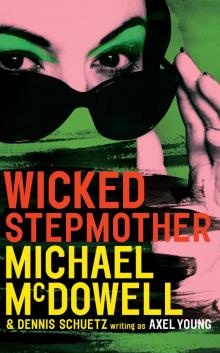 Wicked Stepmother
Wicked Stepmother Blackwater: The Complete Caskey Family Saga
Blackwater: The Complete Caskey Family Saga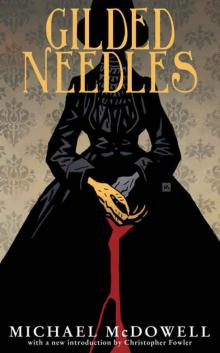 Gilded Needles (Valancourt 20th Century Classics)
Gilded Needles (Valancourt 20th Century Classics)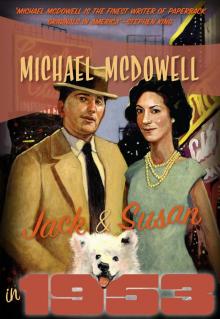 Jack and Susan in 1953
Jack and Susan in 1953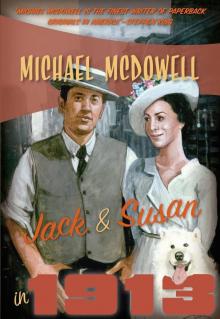 Jack and Susan in 1913
Jack and Susan in 1913 Rain
Rain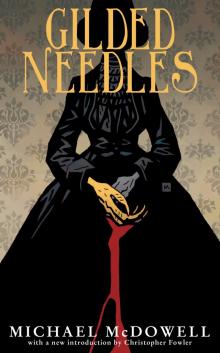 Gilded Needles
Gilded Needles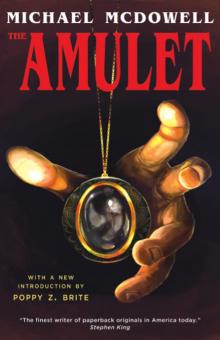 The Amulet
The Amulet Cold moon over Babylon
Cold moon over Babylon The Elementals
The Elementals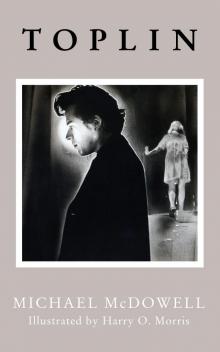 Toplin
Toplin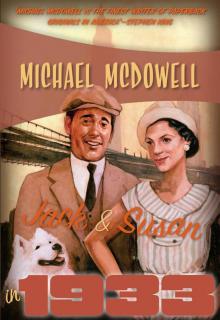 Jack and Susan in 1933
Jack and Susan in 1933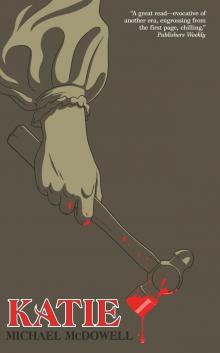 Katie
Katie The Valancourt Book of Horror Stories
The Valancourt Book of Horror Stories